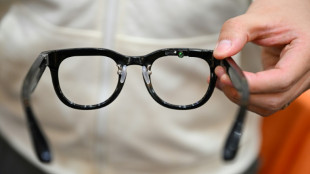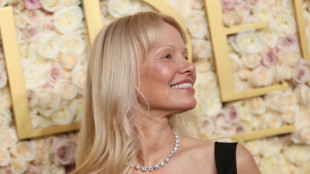
-
 China's women e-sports players defy sexism for love of the game
China's women e-sports players defy sexism for love of the game
-
Tech sector's energy transition draws attention at Vegas show

-
 Five things to know about New Glenn, Blue Origin's new rocket
Five things to know about New Glenn, Blue Origin's new rocket
-
Blue Origin set for first launch of giant New Glenn rocket

-
 Dutch police detain hundreds at climate protest
Dutch police detain hundreds at climate protest
-
Germany battles to secure stricken 'Russian shadow fleet' oil tanker

-
 Malala Yousafzai 'overwhelmed and happy' to be back in Pakistan
Malala Yousafzai 'overwhelmed and happy' to be back in Pakistan
-
'Education apartheid': schooling in crisis in Pakistan

-
 Smart glasses enter new era with sleeker designs, lower prices
Smart glasses enter new era with sleeker designs, lower prices
-
Supreme Court looks poised to uphold TikTok ban

-
 2024 hottest recorded year, crossed global warming limit
2024 hottest recorded year, crossed global warming limit
-
Germany reports foot-and-mouth disease in water buffalo

-
 US hikes reward for Maduro arrest after 'illegitimate' swearing-in
US hikes reward for Maduro arrest after 'illegitimate' swearing-in
-
Robots set to move beyond factory as AI advances

-
 Pro-Russian disinformation makes its Bluesky debut
Pro-Russian disinformation makes its Bluesky debut
-
UK gas reserves 'concerningly low', warns biggest supplier

-
 2024 warmest year on record for mainland US: agency
2024 warmest year on record for mainland US: agency
-
Meta policy reversal puts question mark on future of fact-checking

-
 Meta policy reversal puts question mark on furure of fact-checking
Meta policy reversal puts question mark on furure of fact-checking
-
Strong US jobs report sends stocks sliding, dollar rising

-
 US hiring beats expectations in December to cap solid year
US hiring beats expectations in December to cap solid year
-
UK gas reserves 'concerningly low': Biggest supplier

-
 Global stocks mostly fall before US jobs data
Global stocks mostly fall before US jobs data
-
Ubisoft: the 'Assassin's Creed' maker targeted by suitors

-
 Stock markets drift lower as US jobs data looms
Stock markets drift lower as US jobs data looms
-
Pakistan flight departs for Paris after EU ban lifted

-
 Nobel laureate Malala Yousafzai to visit native Pakistan for girls' summit
Nobel laureate Malala Yousafzai to visit native Pakistan for girls' summit
-
AI comes down from the cloud as chips get smarter

-
 Tajikistan bets on giant dam to solve electricity crisis
Tajikistan bets on giant dam to solve electricity crisis
-
Uruguay bucks 2024 global warming trend

-
 Last 2 years crossed 1.5C global warming limit: EU monitor
Last 2 years crossed 1.5C global warming limit: EU monitor
-
Japan 'poop master' gives back to nature

-
 US Supreme Court to hear TikTok ban case
US Supreme Court to hear TikTok ban case
-
US Fed's December rate cut should be its last for now: official

-
 Paris Hilton among celebrities to lose homes in LA fires
Paris Hilton among celebrities to lose homes in LA fires
-
Airbus boosts plane deliveries in 2024

-
 Ubisoft reviews restructuring options, postpones new Assassin's Creed
Ubisoft reviews restructuring options, postpones new Assassin's Creed
-
Lamborghini sets new sales record amidst hybrid push

-
 Lebanon army chief Aoun becomes president after two-year vacancy
Lebanon army chief Aoun becomes president after two-year vacancy
-
US emissions stagnated in 2024, challenging climate goals: study

-
 Lebanon army chief short of required majority in first round of president vote
Lebanon army chief short of required majority in first round of president vote
-
Global stock markets mixed tracking US rates outlook

-
 Lebanon meets to finally elect president after two-year vacancy
Lebanon meets to finally elect president after two-year vacancy
-
Celebrities flee Los Angeles fires, lose houses as Hollywood events scrapped

-
 Japan startup hopeful ahead of second moon launch
Japan startup hopeful ahead of second moon launch
-
Ukraine allies to hold last defence meet before Trump takes office

-
 Myanmar military adopts anti-junta fighters' drone tactics
Myanmar military adopts anti-junta fighters' drone tactics
-
CES tech looks to help world's aging population

-
 Rubber tappers forge sustainable future in Amazon
Rubber tappers forge sustainable future in Amazon
-
US astronauts upbeat seven months into eight-day mission

| RBGPF | 100% | 60.49 | $ | |
| SCS | -3.01% | 10.97 | $ | |
| NGG | -3.3% | 56.13 | $ | |
| BCE | -2.92% | 22.96 | $ | |
| RIO | 0.36% | 58.84 | $ | |
| JRI | -1.16% | 12.08 | $ | |
| GSK | -1.99% | 33.09 | $ | |
| CMSD | -0.65% | 23.25 | $ | |
| BCC | -1.31% | 115.88 | $ | |
| RELX | -0.86% | 46.37 | $ | |
| RYCEF | -0.42% | 7.07 | $ | |
| CMSC | -0.79% | 22.92 | $ | |
| BTI | -2.34% | 35.9 | $ | |
| VOD | -1.99% | 8.05 | $ | |
| AZN | 0.64% | 67.01 | $ | |
| BP | 0.54% | 31.29 | $ |

Japan's Tenga wants to make sex toys more mainstream
Hourglass-shaped sex toys casually glide along a conveyor belt through an airy new store in Tokyo, the latest attempt by Japanese manufacturer Tenga to sell adult products without the shame that is often attached.
At first glance it's not even obvious that the sleek, colourful products on display are Japan's favourite sex toys for men, but the store has drawn a stream of couples and tourists since opening this year.
"Its openness surprised me," said customer Masafumi Kawasaki, 45, "and made me a bit embarrassed that I'd had a 'naughty' image" of the company.
"I might have thought this was some kind of cosmetics shop," he added.
Although best known for single-use male masturbation aids, known as cups, the Japanese Tenga brand has grown into an intimacy empire, offering toys for men and women, as well as family planning and help for people with sexual disorders.
It is a key player in Japan's adult goods market that Yano Research Institute in 2016 estimated was worth around 209 billion yen ($1.3 billion).
Tenga items are sold in dozens of countries, and nearly half the firm's annual sales of 10 billion yen -- a figure that has doubled over the past six years -- are from overseas.
Founder Koichi Matsumoto, 57, told AFP that he has long strived to de-stigmatise sexual pleasure.
Sex toys for men existed before Tenga, but their crude designs replicating genitalia kept them underground, far from the mainstream image that his firm projects.
Matsumoto recalled seeing such goods hidden in store corners, their packaging decorated with porn actresses and in some cases, cartoons of young girls.
"Those products seemed to say, 'please use us to feel lewd and obscene, because that's what masturbation is'," he said.
"I found that message debasing and wrong -- because it's a fundamental, important human desire."
- 'Lonely, single men' -
Inspired to create something more "positive, friendly and safe", Matsumoto quit his job as a car salesman and embarked on a mission to bring the industry from the "back alleys into high streets".
Tenga products are designed to look different from explicit artificial vaginas and vulvas which Matsumoto says objectify women.
The company's marketing team describes its wares -- including the signature bright phallic cups, vibrators and other toys -- as "artistic".
But prejudices remain around the firm, despite creative collaborations for products such as hipster T-shirts.
Tenga cups are still often misconstrued as catering to "lonely, single men seeking a replacement for women", said Mei Kamiya, a 26-year-old clerk at the new Tenga Land flagship store in Tokyo's trendy Harajuku district.
But masturbation is "normal for everyone", while other Tenga products, such as vibrators, can deepen intimacy between partners, she said.
Japan, like many developed nations, is struggling with a low birth rate, which is fuelling a looming demographic crisis.
But Matsumoto rejects the suggestion that Tenga products promote sexlessness.
"If anything, I think we're doing the opposite of encouraging birth rates to fall" in Japan, he said.
- 'Less taboo' -
Tenga sells sperm monitoring kits for couples hoping to conceive, and tools for those suffering from erectile dysfunction.
Some doctors recommend its healthcare products as "one option" to treat sexual disorders, said Mikiya Nakatsuka, a professor of reproductive medicine at Okayama University.
But there is a tendency in Japan to shy away from sex-related topics, including menstruation and contraception, partly due to conservative school sex education, he told AFP.
"Are we going to see midday TV commercials about Tenga any time soon? I don't think so," Nakatsuka said.
Even so, Tenga's "stylishness and its medical usefulness can help make these types of conversations less taboo".
Going forward, Tenga wants to target the country's ageing population, whose needs it says are often overlooked.
Some elderly people feel they are "automatically assumed to be too old to even have sexual desires", the firm's research found.
Others live with and are financially dependent on adult children, giving them little privacy.
For women in older generations, "there was a time when it was considered shameful or unladylike for them to be open or assertive about sex," Matsumoto said.
"We tell them it is a good, healthy thing."
M.Davis--CPN
